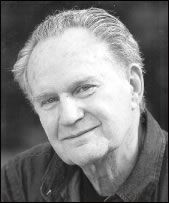By JERRY TALLMER
In the fall of 1988, Crystal Field, the dynamo at the center of First Avenue’s Theater for the New City, begged me to come see a play there called “Heathen Valley” by a writer with the wonderful name of Romulus Linney — or more exactly, Romulus Zachariah Linney IV.
I thought, “What the hell, hillbilly drama,” but I went. There were a lot of hillbillies in it, sure enough, but also — and interestingly — an anti-establishment, crusading, 19th-century Episcopal bishop of North Carolina who is determined to convert the rough-hewn populace of a forgotten pocket of Appalachia (Linney’s boyhood territory) to belief in the Good Word.
Some three years later I went to James Houghton’s Signature Theater on West 42nd Street to see a truly fascinating play by Romulus Limney called “The Sorrows of Frederick,” starring Austen Pendleton (wonderfully) as a half-tyrannical, half-humane, and altogether most oddly poetic Frederick II, king of Prussia in the 18th century.
That was 1991. Only now, 20 years later and Romulus Linney three weeks cold in the ground — January 15, 2011, of cancer, age 80 — do I suddenly see Linney’s Frederick II as, among other things, a doppelganger for the larger-than-life good and bad persona of, yes, none other than our own Lyndon Baines Johnson.
You think I’m crazy? Well, Romulus Linney, not only a writer and playwright, but for many years a teacher of writing at Columbia, Princeton, Hunter, Brooklyn College and many another fount of learning, was one of the most cultured and cross-cultured men you might ever want to meet. His peers — the men and women he drew on, or dug into, or adapted from, or transformed, or multiplied by some other person or persons — were the truest of artists: Chekhov, Strindberg, Dickens, Wilde, Tolstoy, Anna Akhmatova, plus maybe an ax murderer here or there just for salting, along with the Vietnam War.
He was an elegant man, but not too elegant. He was a diffident man but not too diffident. I only learned that Laura Linney was his daughter, not when he and I first talked but when I saw it in some newspaper somewhere. (On the other hand, I interviewed her — at the brilliant far Off Off Broadway start of her career years ago, and she didn’t mention her father either. More recently, when the Signature honored playwright Linney with a lifetime award, actress Linney was lovingly on hand, as was the Edward Albee who has always drawn more spotlight than the no-less-deserving honoree).
Diffident? Crystal Field remembers the day of the big New York City blackout of 1977 when, in an elevator, in the candlelit dark, a fellow tenant suddenly said: “Hello. I’m a playwright” and stuck out his hand. What came out of that initiative was, first, the 1978 production of a play called “Just Folks” — the folks being Jesus Christ and his family — followed by the commissioning by Theater for the New City of half a dozen plays by Romulus Linney and the production there of those and more by him, often directed by him, over the years from then to now.
Cultured and courteous, even courtly, Romulus less Remus may have been, but remember: The milk of the wolf ran through his veins.



































